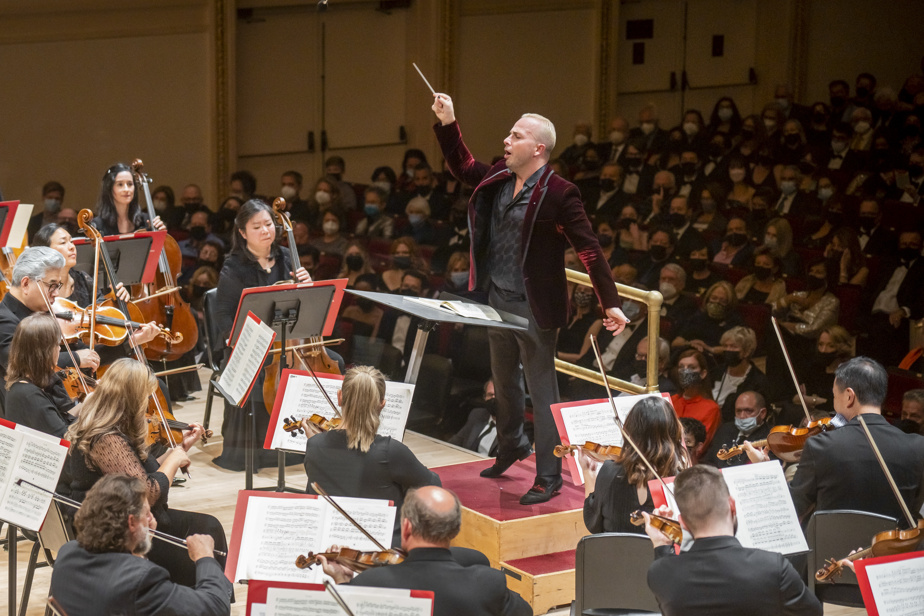Pro Musica made a big splash by opening its season (henceforth only winter) with a recital by the immense Turkish pianist Fazil Say. Music lovers who go to hear him at the Salle Pierre-Mercure on Sunday, January 21 (3 p.m.) will have the chance to hear this true force of nature in Beethoven’s Sonata No. 23, “Appassionata,” and Wagner’s Liebestod (transcribed by Liszt), a selection of Preludes by Debussy, but also one of his own works – Say is an experienced composer. Note that the latter will also perform in Ravel’s Concerto in G on April 10 and 11 with the Quebec Symphony Orchestra.
Announced in 2015, the operatic version of the play Christine, the Queen-Garçon (2012) by Michel Marc Bouchard will finally be created this winter at the Opéra de Montréal (February 3 to 11) with music by Julien Bilodeau, who had collaborated with the playwright for The Beauty of the World (2022). It is the soprano Joyce El-Khoury, the Madama Butterfly of last May, who will play the famous “King of Sweden” (as the androgynous sovereign was called). The baritone Étienne Dupuis will be his cousin – and successor – Karl Gustav. Director Angela Konrad will be at the helm, alongside Jean-Marie Zeitouni and the Montreal Symphony Orchestra.
It happens that immense soloists come together in a trio on a more or less lasting basis. We think of the legendary “Million Dollar Trio” formed in the 1950s by Jascha Heifetz, Arthur Rubinstein and Gregor Piatigorsky. We are not far from it with the violinist Isabelle Faust, the pianist Alexander Melnikov and the cellist Jean-Guihen Queyras, three champions of their respective instruments who have brought us some of the most exhilarating chamber music records of recent years . They will be at Bourgie Hall on February 12 (after having played the day before at the Club musical de Québec) in Schumann’s Trio No. 2, Carter’s Epigrams and Brahms’ Trio No. 1.
Bernard Labadie is best known in 18th century music. Hence the interest in hearing him conduct the Chapelle de Québec and the Violons du Roy in a repertoire far from his usual paths, the requiems of Fauré and Duruflé, two masterpieces of the modern French choral repertoire composed respectively in 1887-1888 (for the most part) and in 1947. This pandemic postponement (the concert was to take place at the end of March 2020) will allow us to hear the finest of Quebec singing, the soprano Magali Simard-Galdès, the mezzo- soprano Julie Boulianne and baritone Jean-François Lapointe, with the assistance of organist Thomas Annand. An unmissable event at the Maison symphonique on Sunday February 18 (2 p.m.).
Klaus Mäkelä is a true phenomenon. At only 27 years old, the Finn is at the head of the Oslo Philharmonic AND the Paris Orchestra! More recently, he added the Royal Concertgebouw Orchestra to his hunting list. It is at the invitation of the OSM that he will visit the Maison symphonique on March 19 with his Parisian ensemble. He can be heard in two absolute masterpieces of the turn of the 20th century symphony, Debussy’s Prelude to the Afternoon of a Faun and Stravinsky’s L’Oiseau de feu, in addition to the Piano Concerto no. 2 by Rachmaninov, which will allow us to hear in Montreal the Korean Yunchan Lim, whose recent victory in the Van-Cliburn Competition at just 18 years old shook the musical world.
The OSM has the excellent habit of inviting, every spring, a conductor from the world of early music. After Bach’s Saint Matthew Passion two years ago with Paul McCreesh and Haydn’s Creation last year with Bernard Labadie, it will be the turn of the Japanese Masaaki Suzuki, on March 27 and 28, to come and take a tour of the Symphony House in Bach’s Saint John Passion. One of the greatest specialists in the Cantor’s music (he has recorded all his cantatas and produced a complete set of his works for organ), Suzuki will be surrounded by the OSM Choir and five soloists, including the renowned tenor Werner Güra.
We can’t say that we rarely hear Yannick Nézet-Séguin in Montreal. What is less common is to hear it with an ensemble other than the Orchester Métropolitain. This will be done on April 19 with the Philadelphia Orchestra, of which he has been music director since 2012. They will compete against Rachmaninov’s Symphony No. 3, which the Russian composer wrote specifically for the group, whose sonority (of strings in particular) was already renowned when it was created in 1936. Montrealers will also be able to hear the Symphony No. 4 by African-American composer Florence Price, of which Nézet-Séguin and the American orchestra were ardent defenders with two highly noticed recordings at Deutsche Grammophon.
With two or three Mahler symphonies per season these years, the OSM and Rafael Payare have made the music of the Austrian composer a specialty. Missing from this recent list, however, is the fateful Symphony No. 6 in A minor, which the Orchester Métropolitain and Yannick Nézet-Séguin will present on June 16 to close the season. It is in the finale of this work that the famous hammer blows are heard, symbol of the “tragic” (this is the nickname of the score) which struck Mahler several times during his life. At the start of the concert, OM will also highlight the disappearance of José Evangelista with his work Alap
